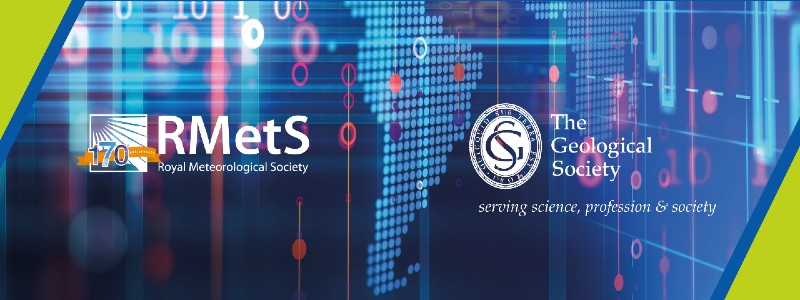

Geoscience data webinar – full details announced
The Royal Meteorological Society (RMetS) in partnership with The Geological Society of London (GSL) is hosting a special webinar on Tuesday 17 November to provide an all-round understanding of the benefits and options available in publishing dataset information.
The event, titled ‘How and why you should publish your Geoscience Dataset’ hopes to provide inspiration and guidance to those who work with datasets. The event will be chaired by Kathryn Royse, Chief Digital Officer at British Geological Survey, and the format will consist of three presentations from leading experts in atmospheric and environmental science data, followed by an opportunity for questions and discussion with the speakers.
We are delighted to announce the speakers will be Douglas Schuster (Manager for the Data Engineering and Curation Section - National Center For Atmospheric Research), Garry Baker (Head of National Geoscience Data Centre - British Geological Survey) and Luca Brocca (Director of Research - National Research Council, Research Institute for Geo-Hydrological Protection).
Using FAIR data principles to accelerate scientific discovery in the ocean and atmospheric sciences
Software and data are essential components in driving scientific and technical advances in Geoscience research. Douglas Schuster will look at what is needed in order to build upon and further the knowledge that has been characterised within data products and software tools, and how we need to produce and curate software and data that is more accessible and easier to be reused by others in alignment with the FAIR Data Principles. These principles are that data should be Findable, Accessible, Interoperable, and Reusable not only for people, but also for machines. This presentation will provide an introduction on how these principles are used to support these goals in the Ocean and Atmospheric Sciences, and how researchers can benefit from fulfilling open science expectations.
Challenges and options for publishing your dataset and the differing data repositories
Garry Baker will examine the options available to authors for sharing a dataset, with discussion around various data repositories. Scientists have historically disseminated their research in papers or articles published in a variety of journals, magazines, websites and more recently via social media channels. This helps with future careers, collaboration, grants or funding. The funders of research, and journal publishers are now keen that the scientific data is also made available, ensuring the transparency and peer-review of current science and scientific processes, while also encouraging future data re-use. The data is no longer the hidden element of the research process and is an output in its own right. Considering how and where you publish are essential aspects of disseminating your research and can also support your career with additional data citation metrics. This presentation will review the options and challenges faced in publishing data with a specific focus upon the environmental domain.
The basics and benefits of writing a data paper
The last session will then be presented by Luca Brocca, who having authored and co-authored over 140 journal papers, will cover the basics of writing a data paper for submission to a data journal, and the benefits of doing so. A data paper is a scholarly journal publication whose primary purpose is to describe a dataset. It allows the authors: (1) to provide a citable journal publication that brings them scholarly credit, (2) to describe the data in a structured form, and (3) to bring the existence of the data to the attention of the scholarly community. Writing a data paper has multiple benefits: e.g., to contribute to reproducible science, to get (potentially) many citations, and to expand significantly the research network. Other benefits will be discussed in the presentation with examples and suggestions for writing a good data paper.
The webinar is free of charge and will be held from 3pm to 4.30pm on Tuesday 17th November 2020 using Demio.
For further details, speaker biographies and abstracts, and to register your attendance, please visit our events page here.
N.B. a Chinese version of the webinar will be held mid-December. Further details will be announced in the coming weeks.

